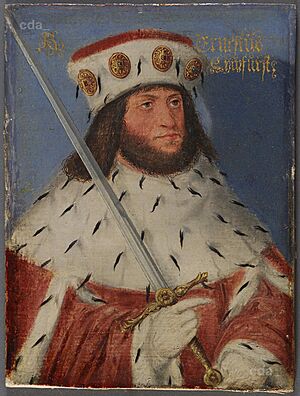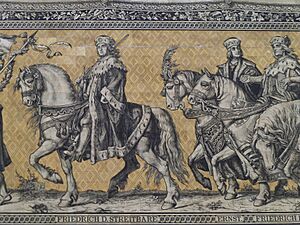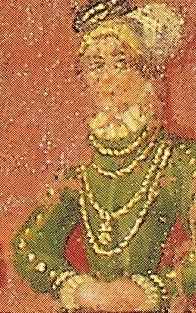Ernest, Elector of Saxony facts for kids
Quick facts for kids Ernest |
|
|---|---|

Portrait by Lucas Cranach the Younger
|
|
| Elector of Saxony | |
| Reign | 7 September 1464 – 26 August 1486 |
| Predecessor | Frederick II |
| Successor | Frederick III |
| Landgrave of Thuringia | |
| Reign | 17 September 1482 – 26 August 1486 |
| Predecessor | William II |
| Successor | Frederick VI |
| Born | 24 March 1441 Meissen, Margravate of Meissen, Electorate of Saxony, Holy Roman Empire |
| Died | 26 August 1486 (aged 45) Colditz Castle, Margravate of Meissen, Electorate of Saxony, Holy Roman Empire |
| Burial | Meissen Cathedral |
| Spouse |
Elisabeth of Bavaria-Munich
(m. 1460; died 1484) |
| Issue among others... |
Christina, Queen of Denmark Frederick III, Elector of Saxony Johann, Elector of Saxony Margarete, Duchess of Brunswick-Lüneburg |
| House | House of Wettin |
| Father | Frederick II, Elector of Saxony |
| Mother | Margaret of Austria-Styria |
Ernest (born March 24, 1441 – died August 26, 1486) was an important ruler in Germany. He was known as Ernst in German. From 1464 to 1486, he held the title of Elector of Saxony. This meant he was one of the powerful princes who elected the Holy Roman Emperor.
Ernest was the founder of a famous family line called the Ernestine line of Saxon princes. Many important rulers came from his family.
Ernest's Life Story
Ernest was born in a place called Meissen. He was the second son of Frederick II, Elector of Saxony and Margaret of Austria. Margaret was the sister of Frederick III, Holy Roman Emperor.
When his older brother Frederick passed away in 1451, Ernest became the next in line to become the Elector of Saxony.
In 1455, something exciting happened to Ernest and his brother Albert. A knight named Kunz von Kaufungen briefly kidnapped them! This event is famous in German history and is known as the Prinzenraub, which means "The Stealing of the Princes."
In 1464, Ernest took over from his father as the Elector of Saxony. He added the region of Thuringia to his lands in 1482. Three years later, in 1485, he made an agreement called the Treaty of Leipzig with his brother Albert. They decided to divide their shared lands.
Through this treaty, Ernest received areas around Wittenberg, parts of southern Thuringia, the Vogtland, and parts of the Pleissnerland. He chose Wittenberg as his main home. He worked hard to improve his country and even introduced a new set of rules, like a constitution.
Just one year after dividing the lands, Ernest died in Colditz. He was 46 years old. His death was caused by falling from his horse.
Ernest's Family
Ernest married Elisabeth of Bavaria in Leipzig on November 19, 1460. They had seven children together:
- Christina (born December 25, 1461 – died December 8, 1521). She married King John I of Denmark.
- Frederick III, Elector of Saxony (born January 17, 1463 – died May 5, 1525). He later became the Elector of Saxony after his father.
- Ernest (born June 26, 1464 – died August 3, 1513). He became an important church leader, serving as Archbishop of Magdeburg and Bishop of Halberstadt.
- Adalbert (born May 8, 1467 – died May 1, 1484).
- Johann, Elector of Saxony (born June 30, 1468 – died August 16, 1532). He also became an Elector of Saxony.
- Margarete (born August 4, 1469 – died December 7, 1528). She married Henry I of Lüneburg.
- Wolfgang (born around 1473 – died around 1478).
 | Roy Wilkins |
 | John Lewis |
 | Linda Carol Brown |



